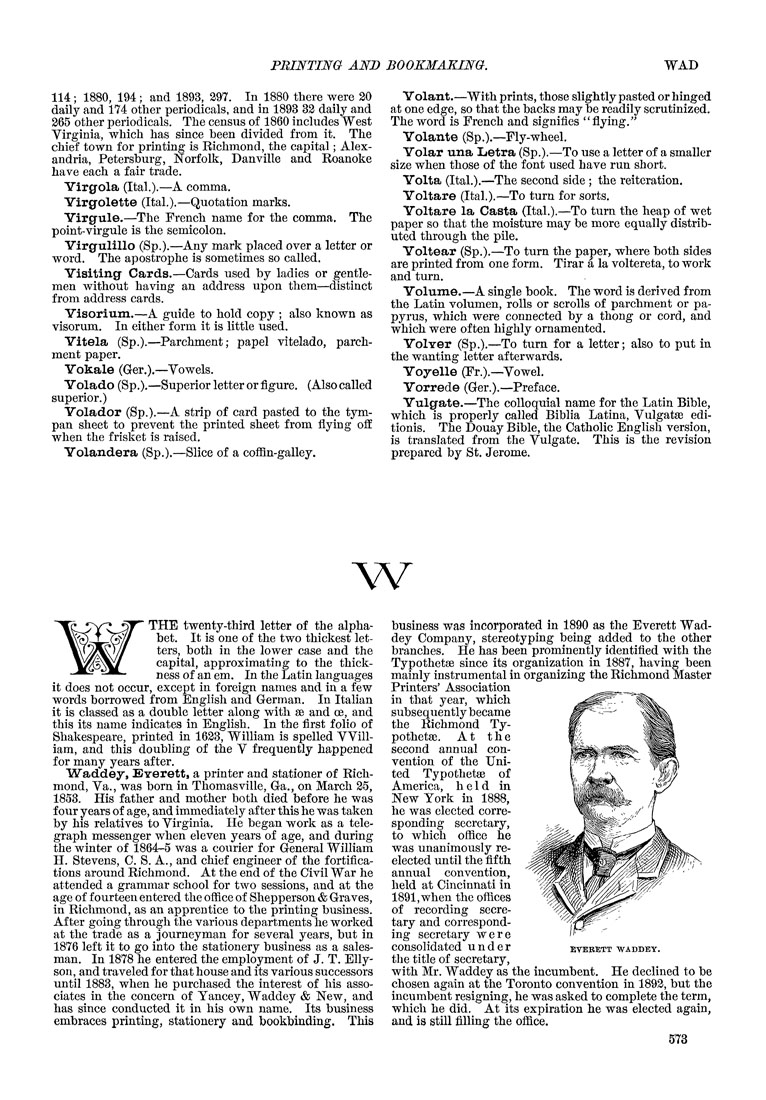PRINTING AND BOOKMAKING.
WAD
114; 1880, 194; and 1893, 297. In 1880 there were 20
daily and 174 other periodicals, and in 1893 32 daily and
265 other periodicals. The census of 1860 includes West
Yirginia, which has since been divided from it. The
chief town for printing is Richmond, the capital; Alex¬
andria, Petersburg, Norfolk, Danville and Roanoke
have each a fair trade.
Yirgola (Ital.).—A comma.
Yirgolette (Ital.).—Quotation marks.
Virgule.—The French name for the comma. The
point-virgule is the semicolon.
Virgulillo (Sp.).—Any mark placed over a letter or
word. The apostrophe is sometimes so called.
Visiting Cards.—Cards used by ladies or gentle¬
men without having an address upon them—distinct
from address cards.
Visorium.—A guide to hold copy ; also known as
visorum. In either form it is little used.
Vitela (Sp.).—Parchment; papel vitelado, parch¬
ment paper.
Vokale (Ger.).—Yowels.
Yolado (Sp.).—Superior letter or figure. (Also called
superior.)
Yolador (Sp.).—A strip of card pasted to the tym¬
pan sheet to prevent the printed sheet from flying off
when the frisket is raised.
Yolandera (Sp.).—Slice of a coffin-galley.
Volant.—With prints, those slightly pasted or hinged
at one edge, so that the backs may be readily scrutinized.
The word is French and signifies "flying."
Yolante (Sp.).—Fly-wheel.
Volar una Letra (Sp.).—To use a letter of a smaller
size when those of the font used have run short.
Yolta (Ital.).—The second side ; the reiteration.
Yoltare (Ital.).—To turn for sorts.
Voltare la Casta (Ital.).—To turn the heap of wet
paper so that the moisture may be more equally distrib¬
uted through the pile.
Yoltear (Sp.).—To turn the paper, where both sides
are printed from one form. Tirar a la voltereta, to work
and turn.
Volume.—A single book. The word is derived from
the Latin volumen, rolls or scrolls of parchment or pa¬
pyrus, which were connected by a thong or cord, and
which were often highly ornamented.
YolYer (Sp.).—To turn for a letter; also to put in
the wanting letter afterwards.
Yoyelle (Fr.).—Yowel.
Yorrede (Ger.).—Preface.
Yulgate.—The colloquial name for the Latin Bible,
which is properly called Biblia Latina, Yulgatse edi-
tionis. The Douay Bible, the Catholic English version,
is translated from the Yulgate. This is the revision
prepared by St. Jerome.
w
' THE twenty-third letter of the alpha¬
bet. It is one of the two thickest let¬
ters, both in the lower case and the
capital, approximating to the thick¬
ness of an em. In the Latin languages
it does not occur, except in foreign names and in a few
words borrowed from English and German. In Italian
it is classed as a double letter along with se and oe, and
this its name indicates in English. In the first folio of
Shakespeare, printed in 1623, William is spelled YYill-
iam, and this doubling of the Y frequently happened
for many years after.
IVaddey, BYerett, a printer and stationer of Rich¬
mond, Ya., was born in Thomasville, Ga., on March 25,
1853. His father and mother both died before he was
four years of age, and immediately after this he was taken
by his relatives to Yirginia. He began work as a tele¬
graph messenger when eleven years of age, and during
the winter of 1864-5 was a courier for General William
H. Stevens, C. S. A., and chief engineer of the fortifica¬
tions around Richmond. At the end of the Civil War he
attended a grammar school for two sessions, and at the
age of fourteen entered the office of Shepperson & Graves,
in Richmond, as an apprentice to the printing business.
After going through the various departments he worked
at the trade as a journeyman for several years, but in
1876 left it to go into the stationery business as a sales¬
man. In 1878 he entered the employment of J. T. Elly-
son, and traveled for that house and its various successors
until 1883, when he purchased the interest of his asso¬
ciates in the concern of Yancey, Waddey & New, and
has since conducted it in his own name. Its business
embraces printing, stationery and bookbinding. This
business was incorporated in 1890 as the Everett Wad¬
dey Company, stereotyping being added to the other
branches. He has been prominently identified with the
Typothetse since its organization in 1887, having been
mainly instrumental in organizing the Richmond Master
Printers' Association
in that year, which
subsequently became
the Richmond Ty¬
pothetse. At the
second annual con¬
vention of the Uni¬
ted Typothetse of
America, held in
New York in 1888,
he was elected corre¬
sponding secretary,
to which office he
was unanimously re¬
elected until the fifth
annual convention,
held at Cincinnati in
1891, when the offices
of recording secre¬
tary and correspond¬
ing secretary were
consolidated under
the title of secretary,
with Mr. Waddey as the incumbent. He declined to be
chosen again at the Toronto convention in 1892, but the
incumbent resigning, he was asked to complete the term,
which he did. At its expiration he was elected again,
and is still filling the office.
573
EVERETT WADDEY.
|








